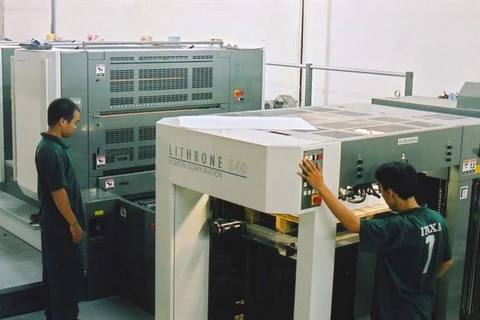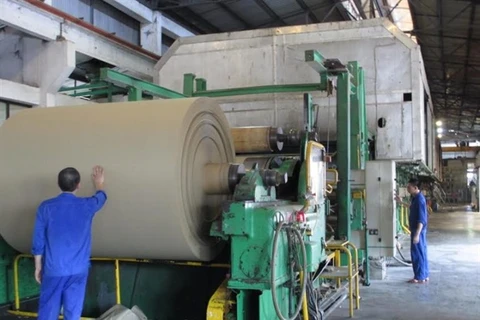HCM City (VNS/VNA) - The paper industry needs to switch from production of normal packaging since supply exceeds demand and invest in other items such as high-quality packaging paper, which is still mostly imported, according to the Vietnam Paper and Pulp Association.
Dang Van Son, the association vice president and general secretary, said the paper industry had grown by over 10% annually in recent years to produce nearly 10 million tonnes a year now.
There are some 500 firms in the paper and pulp industry.
Around 90% of their output is normal packaging paper for the garment and textile, woodworking and other industries.
"Vietnam is now one of the largest packaging paper producers in Southeast Asia," Son told a meeting held to introduce four international exhibitions, Paper Vietnam, Rubber and Tyre Vietnam, Coatings Expo Vietnam, and Plastech Vietnam, in HCM City late last month.
Most of the output was sold domestically, he said.
But since September 2022 the industry had faced difficulties since demand in both the domestic and export markets had shrunk, he said.
“It is currently a supporting industry for exports such as footwear, textiles and furniture, and so their decline in exports has led to a decrease in consumption of packaging paper.”
"Paper mills are only operating at 50- 60% of capacity now," he said.
“We exported one million tonnes of paper in 2022, but this year it may decrease. Export orders have decreased sharply. In the domestic market, demand is forecast to decrease by 10%. This is a huge difficulty for businesses.”
With more new mills set to be commissioned in the coming years, another three million tonnes of output would be added by 2025, mainly of packaging paper, with foreign enterprises too seeking to invest in the industry, he said.
Demand for normal packaging paper is high in the domestic market, but supply has increased faster than demand, leading to oversupply, according to the association.
The country spends billions of dollar to import high-quality packaging, coated and other technical paper varieties.
Besides exporting to traditional markets such as China, the US and EU, the industry should also enter new markets such as the Americas, Middle East and North Africa, Son said.
Participating in trade fairs would give businesses a great opportunity to access new customers.
The industry faces difficulties such as reliance on imported raw materials since investment in pulp production remains modest and lack of skilled human resources.
It imports more than 500,000 tonnes of pulp a year, while the country exports over 15 million tonnes of wood chips, the main raw material for pulp production.
"The industry is naturally suited to a circular economy as its basic raw materials come from planted forests and used paper," Son said.
Addressing the lack of raw materials was among the keys to sustaining the industry, and the Government should encourage investment in pulp production using modern technology that ensures environmental protection, he said.
Fostering co-operation between academia and industry was imperative to ensure skilled human resources for the industry, he added./.
Dang Van Son, the association vice president and general secretary, said the paper industry had grown by over 10% annually in recent years to produce nearly 10 million tonnes a year now.
There are some 500 firms in the paper and pulp industry.
Around 90% of their output is normal packaging paper for the garment and textile, woodworking and other industries.
"Vietnam is now one of the largest packaging paper producers in Southeast Asia," Son told a meeting held to introduce four international exhibitions, Paper Vietnam, Rubber and Tyre Vietnam, Coatings Expo Vietnam, and Plastech Vietnam, in HCM City late last month.
Most of the output was sold domestically, he said.
But since September 2022 the industry had faced difficulties since demand in both the domestic and export markets had shrunk, he said.
“It is currently a supporting industry for exports such as footwear, textiles and furniture, and so their decline in exports has led to a decrease in consumption of packaging paper.”
"Paper mills are only operating at 50- 60% of capacity now," he said.
“We exported one million tonnes of paper in 2022, but this year it may decrease. Export orders have decreased sharply. In the domestic market, demand is forecast to decrease by 10%. This is a huge difficulty for businesses.”
With more new mills set to be commissioned in the coming years, another three million tonnes of output would be added by 2025, mainly of packaging paper, with foreign enterprises too seeking to invest in the industry, he said.
Demand for normal packaging paper is high in the domestic market, but supply has increased faster than demand, leading to oversupply, according to the association.
The country spends billions of dollar to import high-quality packaging, coated and other technical paper varieties.
Besides exporting to traditional markets such as China, the US and EU, the industry should also enter new markets such as the Americas, Middle East and North Africa, Son said.
Participating in trade fairs would give businesses a great opportunity to access new customers.
The industry faces difficulties such as reliance on imported raw materials since investment in pulp production remains modest and lack of skilled human resources.
It imports more than 500,000 tonnes of pulp a year, while the country exports over 15 million tonnes of wood chips, the main raw material for pulp production.
"The industry is naturally suited to a circular economy as its basic raw materials come from planted forests and used paper," Son said.
Addressing the lack of raw materials was among the keys to sustaining the industry, and the Government should encourage investment in pulp production using modern technology that ensures environmental protection, he said.
Fostering co-operation between academia and industry was imperative to ensure skilled human resources for the industry, he added./.
VNA
























